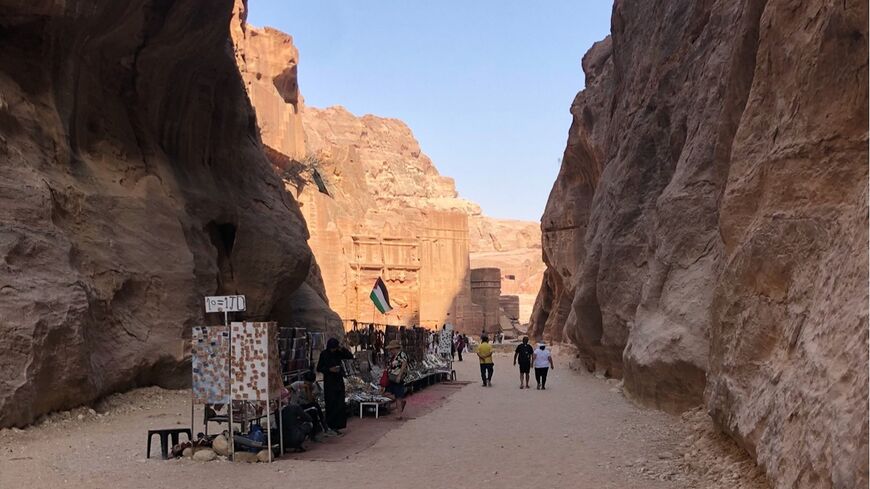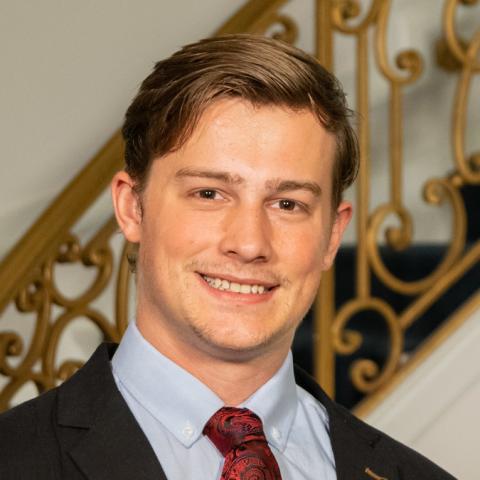WADI MUSA, Jordan — In the early afternoon of Aug. 25, four armored vehicles belonging to the General Directorate of Gendarmerie descended upon the Nabataean ruins of Petra, the focal point of Jordan’s tourism industry that contributes 20% of the country’s GDP. “I was doing a live video when the tanks came in, and that’s when they started launching the gas grenades,” said Natalie, an eyewitness who preferred to withhold her last name due to the incident’s sensitivity. Natalie is an American tour operator who lives in the Petra region with her husband, a member of the indigenous Bdoul tribe.
According to Jordan’s Public Security Directorate, the gendarmes coordinated with the Petra Development and Tourism Region Authority (PDTRA) in a “security campaign” to “remove any nonpermitted installations in the region.” The operation sparked “limited riots,” prompting the US Embassy to issue a now-deleted warning against travel to Petra. Meanwhile, videos depicting tear gas and Bdoul children throwing rocks to repel the gendarmes spread on social media.
In a primetime appearance on Roya TV on Aug. 28, PDTRA Chief Commissioner Suleiman Farajat explained to a national audience, “The problem is that numerous infractions occur within the archaeological site,” including “child labor, the presence of women, aggressive offering of services, the scenic overviews …carriages pulled by horses in a manner that could impact tourists and the presence of souvenir stands everywhere.”
He claimed that “the goal was solely to bring order to the archaeological site since the PDTRA had exhausted all previous solutions.” According to Farajat, the operation “lasted for half an hour, after which the tourism continued. We have good tourist numbers, as usual.”
Local accounts provided to Al-Monitor between Aug. 31 and Sept. 3 contradict Farajat’s narrative concerning the gendarmes’ intervention, its causes and its ramifications.
Regarding the events of Aug. 25, a 53-year-old man from the Bdoul tribe who wished to remain anonymous stated that “the gendarmes entered from here, from our village [of] Umm Sayhoun. They started in Petra. They struck the children for a while, and there was one injury.”
Even after the vehicles were ordered to retreat from Petra, the confrontations continued. The man said, “In Umm Sayhoun, the gendarmes started to fire off gas. Everyone was exposed to the gas. Even I was exposed. The gas came to me here, in my house.” Another anonymous eyewitness stated, “We found a little girl in the street. She is 3 years old and was unconscious because of the gas.” Natalie added, “There were huge clouds of black smoke. It looked like a war zone.”
As for the tourists, Zaid al-Hilalat, who owns a hotel in nearby Wadi Musa, told Al-Monitor that “the customers returned early. They were pretty terrified when they came back, and most of the time they were on the phone with me out of worry, out of fear that the situation might escalate and expand to here, to Wadi Musa.” He continued, “The apprehension remains. People have canceled, and it’s not a small number. Looking at September, the cancellations exceed 15 rooms.”
A Bdoul souvenir seller who has worked in Petra for 23 years but has yet to receive a PDTRA permit to operate her shop legally said, “There are no tourists because of the issue between the gendarmes and the citizens.” She also explained the reason for the “infractions” that Farajat described on Roya TV. “When the coronavirus pandemic broke out, there were no tourists, which affected the Bdoul to a great extent. Unfortunately, the PDTRA did not help the people of Umm Sayhoun.”
The seller continued, “When tourism started again, people had crippling financial commitments and debts because of the coronavirus pandemic. I am one of those people. I don’t own my house. I have a family of six with four girls. My husband does not have a fixed income, and neither do I. We have no salary and no house. We don’t own anything. So this shop is our sole livelihood.”
Abdulrahman Al-Bdoul, who works informally as a guide for tourists wishing to access a scenic overview overlooking Petra’s famous Treasury, agreed. He told Al-Monitor that “during [the pandemic], the Bdoul suffered for a year and a half,” adding that “the PDTRA did not check to see if things they needed were missing. After [the pandemic], people returned to tourism to earn their livelihoods.”
Outside of sparse tourist traffic, the Aug. 25 operation appears to have left Petra untouched. Informal souvenir stands still line the city’s trails, and Al-Bdoul and his colleagues continue to offer their services to visitors as they pass the Treasury.
Contradicting the Public Security Directorate’s statement, a high-ranking PDTRA official who spoke to Al-Monitor on the condition of anonymity asserted that this is intentional, saying that the “security forces had a clearly defined goal: removing the carriages.” Until the PDTRA banned the practice last year, entrepreneurs hailing primarily from Wadi Musa had brought tourists from Petra’s main entrance to the Treasury in horse-drawn carriages. After the 2021-2022 school year ended in mid-June, some children from the Bdoul tribe began using their own nonpermitted carriages to bring visitors to the Treasury.
Nevertheless, Al-Bdoul fears that the crackdown on the carriages is just the beginning. “They want to remove the people in stages: first the carriages and the camels, then the souvenir stands, then the local guides. You see? It’s tantamount to cutting off people’s livelihoods.”
On Roya TV, Chief Commissioner Farajat said that “the PDTRA put in great efforts to resolve these infractions through peaceful means, through speaking with the local community.” Farajat asserted that nonpermitted activities had “begun to damage tourism in Jordan,” necessitating a stronger course of action.
Confronted with Farajat’s claims, the souvenir seller exclaimed, “If what was said on Roya TV were true, the PDTRA would have come and interacted with us — the disadvantaged, the nonpermitted workers — face to face. They would have come to hear our requests, our demands, our conditions. They want to remove us? We support order. But what is the compensation? Did you give me a house in which I can live with my family? Did you secure a job for my husband that I can live from? Did you compensate me for my shop?”
Hilalat used different words to describe the same idea. “I believe that the operation’s goal wasn’t to bring order. Its goal was to project power and intimidate.” Putting himself in the Bdoul’s shoes, he concluded, “The law must be enforced, but don’t bully me. Don’t sever my livelihood and force me to go from being a worker — a breadwinner — to a thug.”







